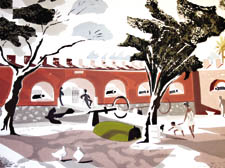|
|
 |
| |

Screen print of Fort Charles |
Draughtman’s contract
300 years ago Port Royal, ‘city of sin’ in Pirates of the Caribbean, was destroyed by an earthquake. Dan Carrier tells the story of the ‘honorary Jamaicans’ of Parliament Hill who set about rebuilding it
LOOKING back, it seemed inevitable to the residents that Port Royal would face some kind of heavenly wrath. The town, established by Britain after invading Jamaica in 1650, had a reputation for its inhabitant’s wicked behaviour.
It was a favoured haunt of pirates, and has remained a city of sin in the public imagination: the Johnny Depp Pirates of the Caribbean films is set around the old port.
Three hundred years later, the Jamaican government is determined to revive the town as part of the island’s heritage. And a key player in that project was a former Highgate councillor, Jean Cox, who died this week.
The morning of Tuesday, June 7, 1692, was sultry. The sea was calm, the only ripples in the bay caused by sharks coming in to feed off scraps thrown by the fishermen.
It was a bad sign, as the town depended on trade from sailing ships. The more superstitious inhabitants believed it was a portent of something worse to come. Minor earthquakes had struck before, and the weather in the days preceding had been still, too. But nothing could have prepared the town’s 8,000 residents for what happened next.
According to one account, the earthquake hit instantly and with deadly consequences. “We felt the house shake and saw the bricks begin to rise in the floor, and at the same instant heard one cry in the street, ‘an earthquake!’,” wrote a merchant who survived.
Much of Port Royal sank beneath the waves, and one of the busiest ports in the Indies degenerated into a fishing village for the next three centuries.
Fast forward to the 1960s when husband and wife Jean and Oliver Cox were on holiday in Jamaica. The couple, one an architect, the other a social scientist, knew the island well. They studied the shanty homes of Trench Town, and wrote a report for the island’s government about low-income housing.
Because of their strong links with the island, when the idea to revive the old Port Royal came up, Jean and Oliver were on hand to advise the Jamaican government.
Oliver, who lives in Parliament Hill Fields, remembers the day he first set eyes on Port Royal. An archaeologist was excavating St Paul’s Church, which was under tons of sand and a good few feet of water. “I took some pictures and I struck me it was an exciting project,” recalls Oliver.
In 1984, the government decided Port Royal should be rebuilt to rid the villagers of poor housing and offer a glimpse into the island’s past.
Jean and Oliver’s first report identified Port Royal as belonging to a select group of archaeological sites that includes Pompeii in Italy.
Oliver was 64 at the time: “I was about to retire. I didn’t realise how much it would end up meaning to me. Port Royal changed my life.”
Divers working for the University of Texas Institute of Nautical Archaeology helped map out what had been lost, and the Cox’s compiled a report for the government.
Two years later, in 1986, they were called back again to help see it come off the drawing board and on to the building site.
They sought to ensure that the town did not simply turn into a Jamaican Disneyland. This meant training local people in the various skills required to service the project. Despite setbacks, including damage by hurricane Gilbert in 1988, work has continued.
It is still a project that enthrals Oliver. The couple last visited Jamaica in 2002 to hand over their documents of the past 20 years to the National Library, and Oliver’s sketch of Port Royal’s main street around 1692 now graces the island’s $500 bill.
At a ceremony celebrating the presentation to the library on St Valentine’s day, island newspapers called the gift a “Message of Love from the Coxes”.
Oliver’s wife Jean died last week, and her memory will not only live on among her friends and family in London, but in Jamaica, too: as the former Prime Minister Edward Seaga put it when he met them, Jean had earned the title of honorary Jamaican. |
 |
|
| |
|
 |
|

